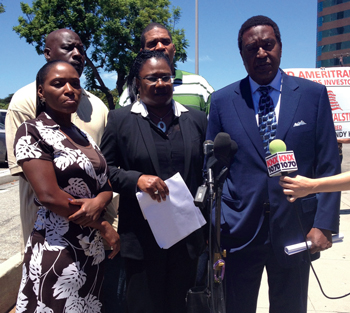By Charlene Muhammad CHARLENEM

LOS ANGELES – Attorneys for the Black woman beaten by a CHP officer have filed a federal civil lawsuit for unspecified damages. A video captured the brutal beating and drew national attention.
Marlene Pinnock is suing for excessive force, conspiracy, assault, battery, due process violations and denial of medical care. Her complaint names California Highway Patrol officer “John Doe,” Commissioner Joseph Farrow and other officers, attorneys Caree Harper and John Burris told reporters during a press conference July 17 outside the West Los Angeles Federal Building the same day the suit was filed.
The lawsuit stems from a July 1 incident immortalized on video as the officer rains blows onto Ms. Pinnock’s head, face and shoulders.
Ms. Pinnock has suffered “great mental and physical pain, anguish, fright, nervousness, anxiety, grief, shock, humiliation, indignity, and embarrassment,” her lawyers noted in the complaint. She feared for her life and was touched in an unlawful and non-consensual manner, they continued.
They charge the defendants violated the 51-year-old’s civil rights individually and in their official roles as peace officers. In addition, Atty. Harper said, expect amendments in the lawsuit. The lawyers intend to add the full name of the officer involved and other defendants, particularly staff who may have participated in hiding Ms. Pinnock under aliases at the first medical facility where she was admitted.
Unfortunately, Atty. Burris said, the lawyers have received no response to requests for the officer’s name, despite a recent California Supreme Court ruling that the public has a right to know the names of officers who engage in misconduct.
“There’s really no exception that would be appropriate here. It is a stall tactic and unnecessary because they should have given his name up, not only to the public in terms of the press itself, but certainly to us when everyone knows we’ve had a vested interest,” Atty. Burris said.
“There’s no expectation of privacy when you beat somebody up on a freeway. We need that name and we’re going to get it,” Atty. Harper said.
The ferocious punches delivered when the officer straddled Ms. Pinnock, pinned her down, and exposed her buttocks to the public were unprovoked, according to the lawsuit.
The document further noted Ms. Pinnock believes “his clear intent was to beat her with such force that would have resulted in her death and is tantamount to attempted murder.”
An eyewitness recording the incident first thought the officer was just going to arrest the defenseless woman, whom he told lawyers did nothing to provoke the beating. He never saw Ms. Pinnock “spit, punch or do anything aggressive prior to or during the filming of the incident,” noted the complaint.
Attorneys expressed outrage that while telling the press and public the agency is not trying to put Ms. Pinnock on trial or trying to make a case about her–that happened when the highway patrol unjustifiably issued a felony search warrant to obtain the woman’s medical records, clothing, and other possessions.
“They filed a search warrant to go to the hospital to try to get incriminating evidence. I’m not certain they did get incriminating evidence but that’s really their motive. Otherwise they wouldn’t have done it,” Atty. Burris argued.
The California Highway Patrol is either seeking to file criminal charges or trying to paint Ms. Pinnock in a most negative light to reduce public empathy for her, the attorneys said.
California Highway Patrol Commissioner Joe Farrow told the Associated Press he had not yet seen the lawsuit and the agency doesn’t comment on pending litigation. He has met with community and civil rights leaders in Los Angeles multiple times since the incident and has pledged that the agency’s internal investigation will conclude in weeks rather than months.
According to the lawsuit, Commissioner Farrow has also told the press the agency was trying to get a statement from Ms. Pinnock, but those efforts came a little too late, Atty. Harper said.
“Why are you trying to get a statement 14 days after the incident? Fourteen days, five press conferences, a partridge in a pear tree. It’s like, just admit wrongdoing. Why is it so hard to say this officer was wrong and we are going to punish him?”












